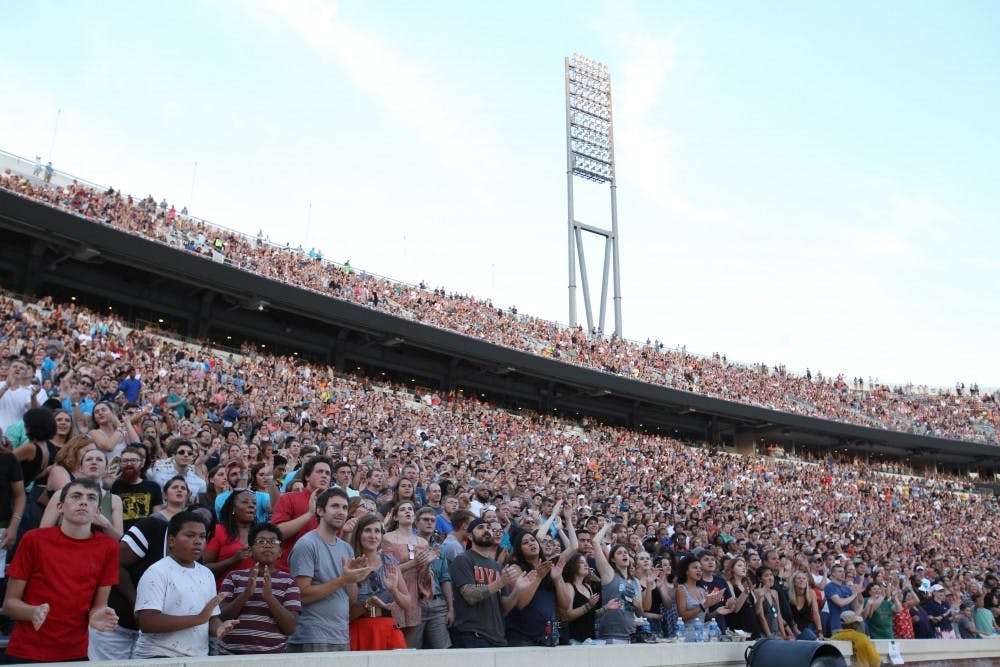A Concert for Charlottesville was an impactful display of unity and strength for the entire Charlottesville community. It was truly a time for the Charlottesville community — residents and students alike — to come together and continue to heal. Despite the gracious efforts by the performers and organizers of the unity concert, students were overlooked in the planning of the event. The ticket lottery promised to place a preference on University students and Charlottesville residents — yet, many students were left without tickets. Additionally, the University failed to adequately distribute information to the student body about the concert. The overlook of student ticket requests and lack of information distributed to students about the concert further adds to the University's poor response to the events of Aug. 11 and 12.
The process of distributing tickets promised to place a preference toward residents of Charlottesville, including University students. The Concert for Charlottesville website lists the following criteria for awarding tickets — first requests from the University students, staff and individuals residing in Charlottesville and the adjacent counties, second requests from individuals residing with zip codes of other counties in the Commonwealth of Virginia and finally requests from outside the Commonwealth. While students could list their residence in Charlottesville — on or off Grounds — there was no place on the registration for students to list their student ID, computing ID or simply check a box confirming their enrollment in the University. Although Charlottesville residence and enrollment at the University were equally weighted in the lottery, there still should have been a place for students to confirm their enrollment in the University if enrollment was to be considered in the criteria for awarding tickets.
The simplest solution to this issue would have been to set aside approximately 15,000 tickets for all undergraduate students at the University. This would have ensured that all interested would have access to a ticket. Instead, because of poor planning, many students were left without tickets. 15,000 tickets is just a fraction of the over 60,000 tickets that were distributed. While there were several additional ticket releases after the initial release, these were held early in the morning and poorly communicated to the student body. The University, in the interest of their students, should have partnered with the organizers of the concert in order to ensure tickets for all students who requested one.
Furthermore, it would have been advantageous to create a student section on part of the field and in several sections of the stands for safety reasons. Because of the strict security at the event, concert goers were required to remain in their designated section. This presented challenges for many students who did not know anyone in their sections and were separated from their friends in other sections. In the days prior to the concert, students posted in class Facebook pages and group messages in hopes of trading tickets in order to be in the same section as their friends. If a student section was in place, the confusion and trading of tickets would have been eliminated.
The strict security measures which were in place at Scott Stadium on Sunday night is another example of the University’s failure to disseminate information about the concert to the student body. Information about the concert spread through word of mouth and social media — there was no email from President Teresa Sullivan or other administrators regarding the concert or the influx of people on Grounds Sunday evening, which could have potentially posed a safety risk for students who reside near Scott Stadium. In a world where students receive text alerts about the solar eclipse from the University, it would be expected that students receive some form of communication about a large concert occurring on Grounds. Furthermore, information such as the new clear bag policy in Scott Stadium or cash only dining options at the concert, would have been helpful to circulate to the student body. Additionally, an email regarding safety measures to take before, during and after the concert would have been beneficial, considering that the concert was six hours long with temperatures in the upper 80s. This lack of communication from the University is not a new phenomenon. The failure of the University to properly inform students about safety measures and other pertinent information regarding A Concert for Charlottesville mirrors the University’s poor response to the events on Aug. 11 and 12.
While the majority of the student body was not on Grounds during the events of Aug. 11 and 12, they have nevertheless felt the impact of the events. Our Grounds will never be the same after the invasion of the Lawn by white supremacists. Students are still trying to make sense of the events that occurred in Charlottesville this summer just as much as those who were present in Charlottesville on Aug. 11 and 12. By failing to provide adequate information about A Concert for Charlottesville to the student body and ensuring tickets for all students who requested one, the University has once again failed to provide a proper response to the events this summer.
Mary Alice Kukoski is an Opinion viewpoint writer for the Cavalier Daily. She may be reached at opinion@cavalierdaily.com.







